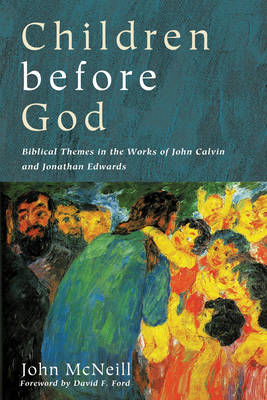
Door een staking bij bpost kan je online bestelling op dit moment iets langer onderweg zijn dan voorzien. Dringend iets nodig? Onze winkels ontvangen jou met open armen!
- Afhalen na 1 uur in een winkel met voorraad
- Gratis thuislevering in België vanaf € 30
- Ruim aanbod met 7 miljoen producten
Door een staking bij bpost kan je online bestelling op dit moment iets langer onderweg zijn dan voorzien. Dringend iets nodig? Onze winkels ontvangen jou met open armen!
- Afhalen na 1 uur in een winkel met voorraad
- Gratis thuislevering in België vanaf € 30
- Ruim aanbod met 7 miljoen producten
Zoeken
Children Before God
Biblical Themes in the Works of John Calvin and Jonathan Edwards
John McNeill
Paperback | Engels
€ 44,95
+ 89 punten
Uitvoering
Omschrijving
This work seeks to delineate a theological framework into which biblically informed imagery and language of children in relation to God can be placed. McNeill's aim is to offer a work of positive construction within the general Reformed tradition. The book shows that John Calvin has much to offer in this respect, but by examining the imagery and language of children in his works it is shown that Calvin is not adequately biblically informed in this area. McNeill argues that Jonathan Edwards provides a theological tool that enables a construal of children more in keeping with biblical language and imagery. The book then offers a general critique of current child development theories in which providential activity in child development is more or less ignored. By adopting Calvin's theological framework to understand children before God, it is argued that the integration of child development and divine providence becomes a distinct possibility. This work should be of interest to those working in biblical, childhood, Calvin, and Edwards studies, as well as to the more general practitioner working with children in church and society.
Specificaties
Betrokkenen
- Auteur(s):
- Uitgeverij:
Inhoud
- Aantal bladzijden:
- 238
- Taal:
- Engels
Eigenschappen
- Productcode (EAN):
- 9781498281065
- Verschijningsdatum:
- 9/11/2017
- Uitvoering:
- Paperback
- Formaat:
- Trade paperback (VS)
- Afmetingen:
- 152 mm x 226 mm
- Gewicht:
- 408 g

Alleen bij Standaard Boekhandel
+ 89 punten op je klantenkaart van Standaard Boekhandel
Beoordelingen
We publiceren alleen reviews die voldoen aan de voorwaarden voor reviews. Bekijk onze voorwaarden voor reviews.











